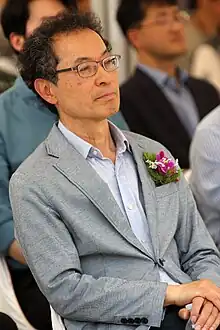Choi Kiwoon
Choi Kiwoon is a theoretical particle physicist researching focusing on particle theory and cosmology.[1] He was a research professor at Chonbuk National University and a full professor at KAIST. He is the founding director of the Institute for Basic Science Center for Theoretical Physics of the Universe. He is a member of the Korean Academy of Science and Technology.[2][3]
Choi Kiwoon | |
|---|---|
 | |
| Born | 7 November 1959 |
| Nationality | South Korean |
| Alma mater | Seoul National University |
| Awards | Korea Science Award, National Scholar, Scientific Citation Laureate |
| Scientific career | |
| Fields | Particle physics, cosmology, physics beyond the Standard Model, dynamical symmetry breaking, string phenomenology |
| Institutions | Harvard, Johns Hopkins, Carnegie-Mellon, UC San Diego, Chonbuk National University, KAIST, Institute for Basic Science |
| Thesis | Dynamical solutions of the strong CP problem (1985) |
| Korean name | |
| Hangul | |
| Hanja | |
| Revised Romanization | Choe Giun |
| McCune–Reischauer | Ch'oe Kiun |
| Website | Center for Theoretical Physics of the Universe |
Education
Choi received his B.S., M.S. and Ph.D. in physics from Seoul National University in 1981, 1983, and 1986, respectively.[4]
Career
Moving to the United States, Choi started his career as a visiting postdoctoral research associate at Harvard in 1986. Next he was postdoctoral research associate at Johns Hopkins University in 1987, Carnegie Mellon from 1988 to 1990, and UC San Diego from 1990 to 1992.[5] Returning to Korea, the next two years were spent as a research professor at Chonbuk National University. A majority of his career was in KAIST in Daejeon, starting as an assistant professor in 1994, associate professor in 1996, and full professor from 2001. Leaving KAIST, he became the founding director of the Center for Theoretical Physics of the Universe (CTPU), established November 2013.[6][7] Research at CTPU focuses on physics beyond the Standard Model, including understanding the fundamental theoretical frameworks of physics and investigating the origin of the universe through particle physics.[8][9]
Honors and awards
- 2011: Korea Science Award, Ministry of Science, ICT and Future Planning and National Research Foundation of Korea[10][11][12]
- 2007: National Scholar, Ministry of Education and Human Resources Development and Korea Academic Promotion Foundation[13][14]
- 2007: Scientific Citation Laureate Award, Thomson Scientific and Korea Science and Engineering Foundation[15][16]
References
- "Kiwoon Choi - Google Scholar Citations". Google Scholar. Retrieved 18 January 2019.
- "한국과학기술한림원 - 회원 - 회원소개". Korean Academy of Science and Technology (in Korean). Retrieved 11 January 2019.
- 송, 경은 (24 January 2017). "과학기술 석학 한 자리에…한림원, 신입 정회원 31인 영입". Donga Science. Retrieved 11 January 2019.
- "최기운 - 네이버 인물검색". Naver (in Korean). Retrieved 11 January 2019.
- "최기운 KAIST 물리학과 교수: 이론 입자물리학의 대가". Nobel Science (in Korean). Retrieved 11 January 2019.
- 류, 준영 (2 January 2014). "IBS, 2차 연구단장에 로드니 루오프·최기운씨 선임: 3년간 20개 연구팀 단장 선정". Money Today (in Korean). Retrieved 11 January 2019.
- 윤, 미선 (4 January 2014). "미래부, 2013년 2차 연구단장 최기운 선정". Asia News Agency (in Korean). Retrieved 11 January 2019.
- "Center for Theoretical Physics of the Universe (Particle Theory and Cosmology Group)". Institute for Basic Science. Retrieved 18 January 2019.
- "Delving into the origin of the universe and the fundamental laws of nature". Institute for Basic Science. 10 June 2020. Retrieved 4 March 2021.
- 김, 혜민 (15 December 2011). "박종일·최기운·노정혜 교수, 한국과학상 받아: 젊은과학자상에 권성훈·안종현·정운룡·김수민 시상식 16일 오후 3시 서울프레스센터". Edaily (in Korean). Retrieved 11 January 2019.
- 박, 지현 (30 October 2014). "IBS, 신규 연구단장에 로드니 루오프·최기운 교수 선정". Financial News (in Korean). Retrieved 11 January 2019.
- 노, 미란 (2 January 2014). "루오프 교수·최기운 단장, IBS 연구단장으로 추가 선정" (in Korean). 아시아경제. Retrieved 11 January 2019.
- 이, 익훈 (18 December 2007). "충남대 류동수 교수등 '국가석학' 15명 선정". Naver (in Korean). Retrieved 11 January 2019.
- 노, 희영. "김영민 교수 등 15명 '국가석학' 선정". Naver (in Korean). 서울경제. Retrieved 11 January 2019.
- 박, 정출 (18 May 2007). "포스텍 안진흥·박종문 교수, 독창적 연구영역 개척 과학자에: 톰슨사이언티픽사 한국인 9명 선정". 매일신문사 (in Korean). Retrieved 11 January 2019.
- 민, 태원 (17 May 2007). "'독창적 연구분야 개척' 한국 과학자 7명 선정". Naver (in Korean). 쿠키뉴스. Retrieved 11 January 2019.
Publications
- Jeong, Jaeseung; Kaang, Bong-kiun; Lee, Jung-Mo; 이, 현숙; Choi, Kiwoon (20 July 2012). 인간과 우주에 대해 아주 조금밖에 모르는 것들 [What don't we know? Science 125 Questions] (in Korean). 낮은산. p. 288. ISBN 9788989646822.